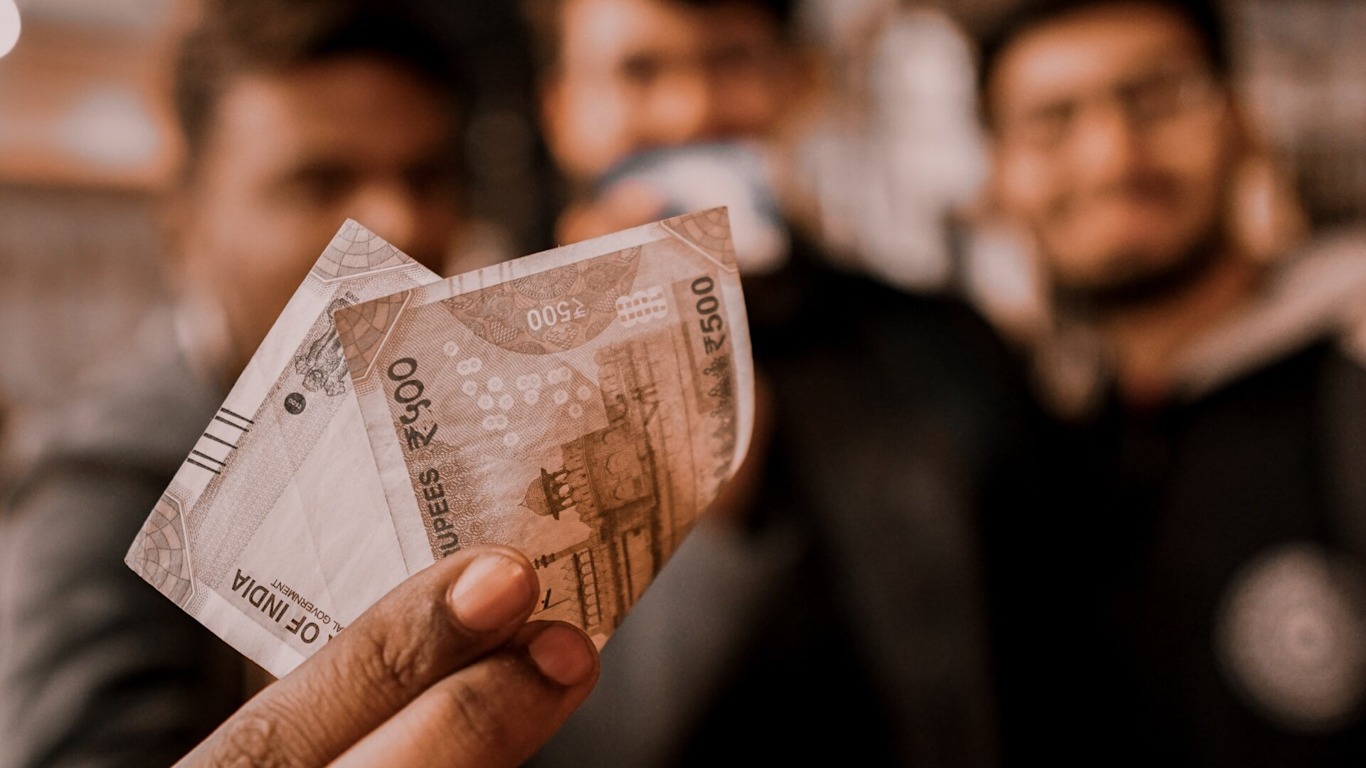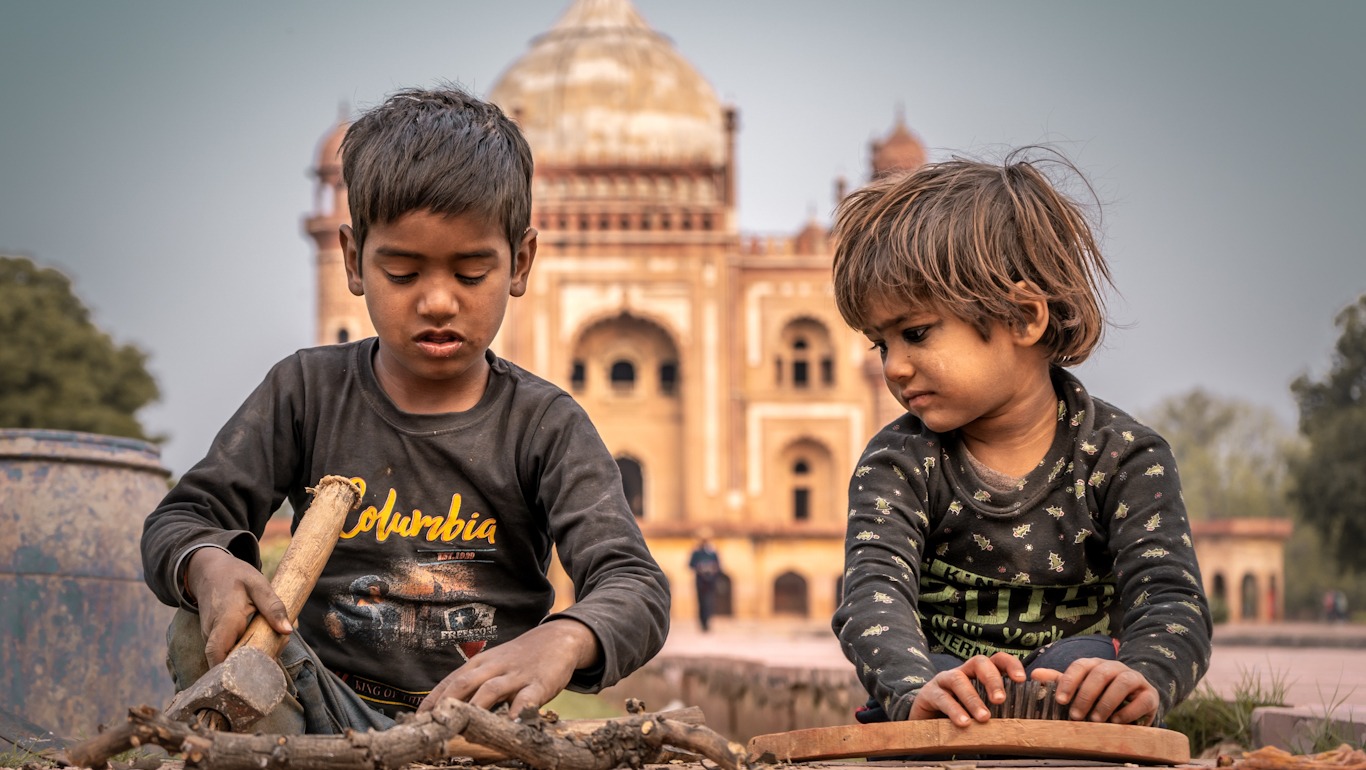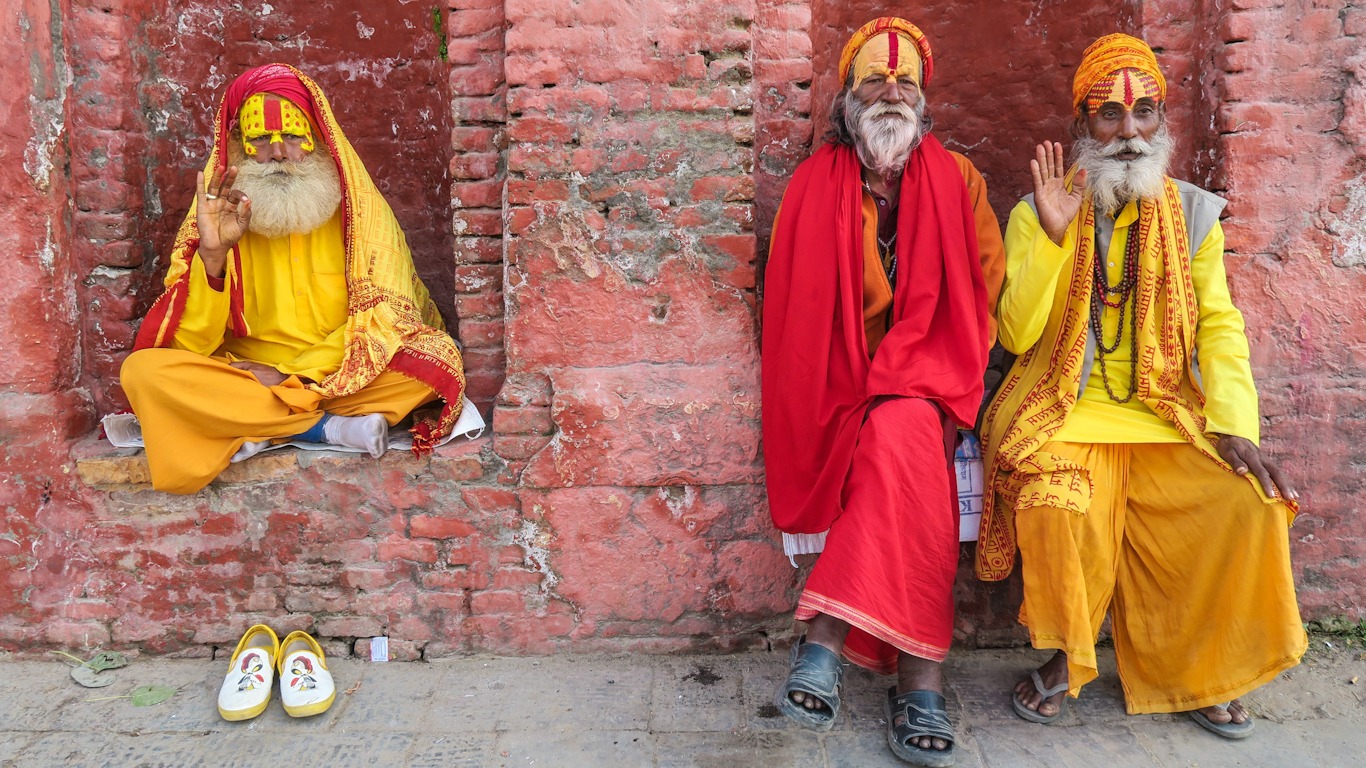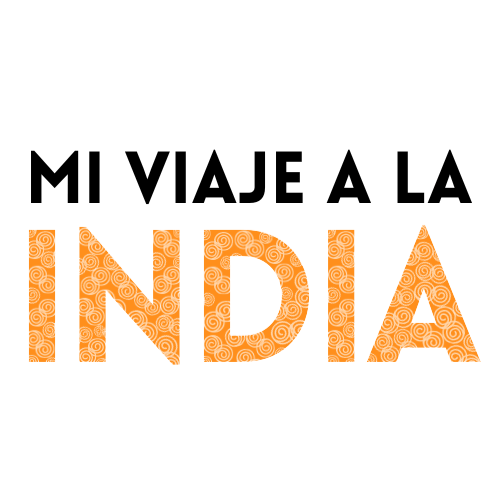You are preparing your trip to the country of spices, you have been told about the scams in India and you are afraid of falling into the trap and ruining your experience..
I understand you totally!!!We've all gone through this on our first trip to India (me too). But don't worry, in this article I will explain you the most popular scams in India and give you several tips on how to avoid getting scammed..
To protect yourself, I always recommend you to be wary but that doesn't mean that you need to close yourself off and don't connect with the locals as that is the best experience of this trip. Use your instinct and common sense and follow my advices to avoid headaches and wasting money.
Why are tourist scams popular in India?
India is a country that despite being very rich, has a lot of poverty. Currently 30 % of the population lives in extreme poverty. The need to make a living and the roguishness of its people have evolved into an amazing knack for taking advantage of foreigners who visit the country. Worst of all, they don't feel bad for doing so, this is, in a way, their business technique and after all, for them all tourists are "rich" so they don't consider that they are cheating us.
List of scams in India and my tips to avoid falling into the trap
Fake websites for online visa processing
There are several fake websites for online visa processing, which are scams. Do not rely on any non-government web site and always use the official website to obtain a visa to India. The process is quite simple, here is an explanation step by step in this article,but if you prefer to pay a commission to have the paperwork done by an agency you can do it with the iVisa website.
Cab from airport to hotel much more expensive and as a hitch to other scams
Upon arrival at the airport (especially at Delhi airport) you will have a multitude of cab drivers at the door and very friendly people offering transportation services to take you to your hotel.
In order to protect your safety and budget, DO NOT take one of those cabs! The price will be 3 or 4 times more expensive and you may also get caught up in one of the scams. I share in this list... such as taking you to a tourist office with the intention of selling you tours or taking you to a hotel that is not the one you booked.
On the other hand, some hotels and guest house will offer you a pick-up service at the airport, but beware that some receptionists or concierges are associated with the cab drivers I mentioned before, so you may run the same risks.
If nevertheless, you decide to take one of these cabs, negotiate the price before starting the trip as most of them do not use a taximeter.
How to avoid falling for a scam
Always book your cab with Uber or Ola Cabs Apps. It's super convenient, cheaper, you don't have to negotiate price or haggle, it's much safer than taking a random cab and you can also follow the route and your location in real time.
However, keep in mind that if you buy the Indian SIM on arrival at the airport, it will take a long time to be activated so if you prefer for the first trip you can make a cab reservation in advance, (it is usually more expensive but you arrive with the peace of mind of having the cab waiting for you). Another option to make your reservation in Uber or Ola Cabs on arrival, would be to buy the SIM for India from your country of origin with Holafly. This is a slightly more expensive option but the most comfortable if you prefer to reach the country and have internet immediately. Also, because being a reader of MiViajealaIndia, you have a discount of 5% from this link.
5 % DISCOUNT on Heymondo Insurance
To travel to India or any other destination (and at any date)
Tourist information office in big cities: one of the most common scams in India
This is the number one scam in India. In the big cities there is a network of allies to scam tourists. This is made up of cab or tuk tuk drivers, receptionists or other hotel staff, even people you meet on the street, at the airport or train stations and in the most touristy areas.
They extend you all their kindness and offer to take you to a tourist information office where they claim they will inform you about the best places to visit and give you free maps of the city. In most cases these offices are not official and are basically travel agencies that sell you tours, train tickets and other services (with very high prices) and the person who has taken you there gets a commission.
In Delhi, be especially careful in the Connaught Place area. as there are many of these agencies and almost all of them have signs "Free Tourist Information Office", "government approved office" etc.
How to avoid falling into the trap
When someone offers you to go to an official tourist office, always be suspicious. And if for some reason you fall into the trap and arrive at one of these agencies, say thank you and leave.

The tuk tuk scam
The tuk tuk , rickshaw drivers never use the taximeter even though they are supposed to. If you don't ask the price of your trip before getting on, you are lost because they can ask you whatever they want and you can't argue much.. On the contrary, if you have negotiated the price before boarding, they also try to sneak it to you and when you arrive at the destination they may tell you that the price is higher because of rain, traffic, because there are streets cut offs and you have had to take a longer route or they even tell you that the price you have agreed was per person and if you are two or more, it is double or triple.
How to avoid falling for a scam
I recommend to book the tuk tuk in the Ola Cabs App or Uber and save time and money..
If you are one of those who like to take the tuk tuk by the road, always negotiate the price before getting on and make sure it is the total price of the trip, also use the maps that you have downloaded to see your location and that you are not going around in circles to charge you more.
India Travel Guide
The most complete guide to organize your trip to India, with tips and resources to save time and money.
Your hotel is closed or this address does not exist
Cab and tuk tuk drivers are very creative when it comes to deceiving you. Some will tell you that your hotel does not exist, is closed or cannot be accessed because the street is closed due to demonstrations or some other catastrophe of various kinds. Once they agitate you with this information, the next step is always to tell you that they will help you find a solution, call a good friend and you show up at the fake tourist office (and there you know what happens!).
How to avoid falling for one of these scams in India
I recommend that if it is your first time in India, book the transfer from the airport to the hotel in advance or upon arrival with the Uber App.

The "cancelled" trains
When you arrive at the train station you are approached by a man, in many cases in uniform (fake), and very kindly he asks you to show him your ticket. Then he tells you that your train has already left, that it has been cancelled because they are repairing a section of track or because of an accident, that your ticket is not valid, that the class-category you have booked is for Indian citizens only... Then, to your bewilderment he will tell you that the station office is closed but that he will accompany you or find you a cab to take you to an office outside the station, which happens to be the tourist information office (agency) that I mentioned before.
Once you are there, they will tell you again that the train is cancelled (not true) and try to sell you another ticket at a higher price. In some cases they will even tell you that due to some festival, celebration, flood or meteorite...the tickets are sold out and they offer you to get to your destination by private car or plane.
How to avoid falling into the trap
Never show your ticket You should only be asked by the train inspector, the ticket collector or if you go to the ticket counter to ask for information. Always check the information panels on the trains in the waiting areas and on the platforms, and do not establish much conversation with extremely friendly and insistent people.If you want more tips for your travels by train, you can read my guide about trains in India.
Namaste, "I'll bring you the suitcase".
India is well known for the hospitality and friendliness of its people to tourists. You arrive at the airport or railway station and a guy comes up to you (sometimes in uniform) and without asking, says "I'll take your suitcase" or "I'll help you with your suitcase", and you think, pure kindness!
Well, when you get to the boarding area or the platform the kindness vanishes and he asks for 500-700 rupees.
No one has to do anything for free but in this case they should tell you the price before you pick up your suitcase as they take advantage of the innocence of the novice tourist.
How to avoid being cheated
Knowing this, if you are not interested in having help with your lugagge, tell them directly and categorically and if on the other hand you are tired or do not know where the platform is etc. and you prefer toget his help, then negotiate the price beforehand.
Just as there are scammers, there are also very nice people. On my last trip, the guy I paid to take my suitcase to the platform offered to come back and put it on the train once it entered the station because it was too heavy, and yes, after an hour when I thought it was lost, he showed up to lift the suitcase on the train!
Tourists always pay more
Whether it is the cab, the tuk tuk, the bazaars or any store that does not have the products labeled with their prices, if you are a tourist you will pay more! In addition, each tourist is offered a different price.
How to avoid falling for a scam
In stores and bazaars, always bargain. But don't abuse and try to reach a price that is beneficial for both of you.
For cabs always use the Apps Uber or Ola Cabs.
For trips in tuk tuk, the easiest way is to book directly with Ola Cabs. If you like to board the tuk tuk at the street, then negotiate the price before getting on and always bargain. For this and as a comparison you can use Ola Cabs / Uber to see what would be the price for that trip and thus have more tools to negotiate the price.

They tell you that you have the wrong bill
Although it is not one of the most widespread scams, in some stores the seller will play a trick and give you change for 100 when you have paid him with a 500 bill. or he will tell you that you made a mistake and instead of a 100 bill you gave him a 10.
How to avoid falling into the trap
Always make sure you know which bill you are giving to make a payment. And if you know you're right and they're pulling your leg, tell them firmly with a disapproving face and don't be fooled.
Street vending in tourist spots
Traders occupy every corner of the country and many will chase you to ensure their sale. It is very common to find street vendors at the entrance of monuments and temples. The prices they offer will be much higher than in a market or store.
How to avoid falling for one of these scams in India
Bargain! because when you see the same product 4 times cheaper, you won't like it!
Sale of gems and jewelry
This is one of the most dangerous scams in India, very popular in Jaipur, Agra and although in a smaller proportion also occurs in Rishikesh.
When you enter a gem store they may try to offer you to do business by bringing gems to your country, in some cases you will pay for them and an Indian buyer (a camouflaged ally) will buy them from you in your home country, most of the time the gems are fake. At other times, they do not ask you to pay for them but ask for a financial guarantee with your card number and some authorizations.
There have been cases of tourists who have acquired gems for which no payment has been made but financial guarantee and when the person in question has arrived at their destination has received a call from the customs authorities to denounce them for jewelry theft and fine them, obviously these "authorities" are false and it is a way to manipulate and get money out of the person involved.
How to avoid falling for a scam
If you are offered any jewelry or gemstone business, be suspicious and never agree.
Entrance fees to monuments, temples or parks
At some tourist sites you will meet a guy in uniform before you get to the entrance. Occasionally it will tell you that you cannot enter without a ticket, when in fact the entrance to the site is free of charge, (this happens at the Jama Masjid Mosque in New Delhi and the Monkey Temple in Jaipur among others). They may also tell you that the entrance is free for Indians but tourists have to pay, or that that day coincides with a special celebration and you have to pay admission.
In other occasions you will have people at the entrance of a monument offering you tickets to avoid the queues at the ticket office, in this case there are two options: they sell you a good ticket but with the re-sale surcharge or they will sell you a fake ticket and after paying for it they will not let you in.
How to avoid falling for one of these scams in India
Always buy tickets at the ticket office of the monument itself, and don't get carried away by people at the entrance to the venue.

Children begging in the street
In India there is a lot of poverty but of the people you see on the street begging there are two types: those who are asking for money to eat and those who are used by a mafia to make tourists feel sorry for them and thus collect money.
How to avoid being cheated
Even if it breaks your heart, do not give them money to them because if you do, you will be participating in the expansion of these mafias. I usually buy food directly for them and here you can see the difference between one and the other, since those who ask for food accept it and are grateful, while those who are part of a mafia, most of the time grumble and are not satisfied when they are offered food.
A mother asks you for food or milk for her children.
Related to the previous scam, there are mothers who use their babies to soften your heart and do not ask you for money but for milk. Most people fall for this unique scam. The mother takes you to a store a few meters away and the shopkeeper charges you 3 or 4 times the price for the milk. When you leave, the mother gpes back to the store to return the milk to the shopkeeper (they are allied), they share the profits and both of them make money.
How to avoid falling for one of these scams in India
In this case there are also mothers who ask for milk in an honest way to feed their babies, so use your common sense and intuition and do what you think is right, but it is good for you to know that there are scams on those matters as well.
Children asking you for photos (with your cell phone or camera).
A child approaches you and asks you to take a picture with him or them, but always with your camera or cell phone. Once you have taken the nice picture, the child or the parent directly asks you for money. This scam is typical in places like Fathepur Sikri or Mathura.
How to avoid falling into the trap
Always say no to these requests in a firm manner.. These children are usually very persistent and will do everything possible to get your attention, try not to lose your temper as they are not to blame and are puppets of the exploits of an adult, ignore them and continue with your visit.
Namaste, "I take your picture".
You may encounter people who will offer to take a picture of you with your camera or phone and ask for money before returning it to you. This is quite common at the Taj Mahal and Fatehpur Sikri.
How to avoid being ripped off
Do not accept! If you want someone to take a picture of you, ask a traveler like you or an Indian family.. And be guided by your intuition.
Blessings with bindis, bracelets and offerings
At the temples and spiritual areas you can find Sadhus or children who will offer you blessings in the form of mantra, lucky bracelets, bindi on the forehead or amulets.. Suddenly you feel that exotic spirituality of India and that's when they ask you for money and the spiritual magic disappears. Very typical in places like Varanasi, Haridwar and Mathura.
How to avoid falling for one of these scams in India
Saying no to them from the beginning. always with kindness but with a lot of firmness.

Sadhus with doubtful spirituality
Everything can be turned into business and this also includes the more spiritual and religious matters. When you visit sacred cities like Varanasi, Haridwar or Rishikesh be prepared to meet Sadhus (Hindu monks who live in total austerity with the intention of reaching enlightenment) for real, and also Shadus who disguise themselves as the real ones and take advantage of the kindness and innocence of travelers..
How to avoid falling into the trap
After a few days you will be able to differentiate them easily. Real Sadhus are focused on their spiritual practice and will not approach you insistently. or ask you for anything.
Now that you know the most popular scams in India, always travel carefully but don't let these risks of being ripped off break the magic of travel. The magic of India happens on the streets and in contact with the locals so do not let your guard down but enjoy it to the fullest because you will meet a lot of wonderful people who will help you without expecting anything in return and will make you experience the Indian hospitality..


Leave a Reply